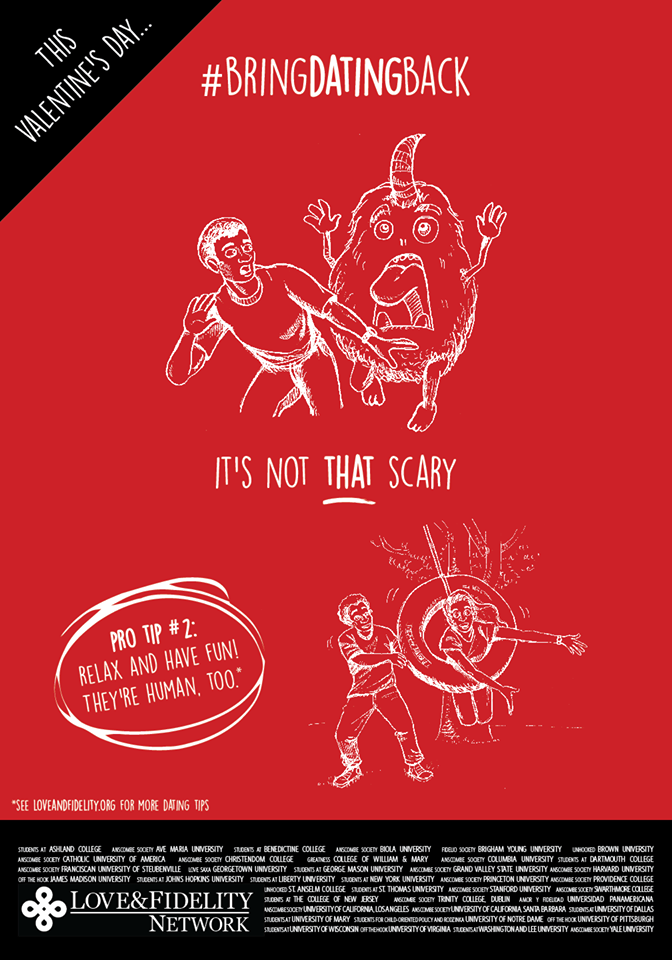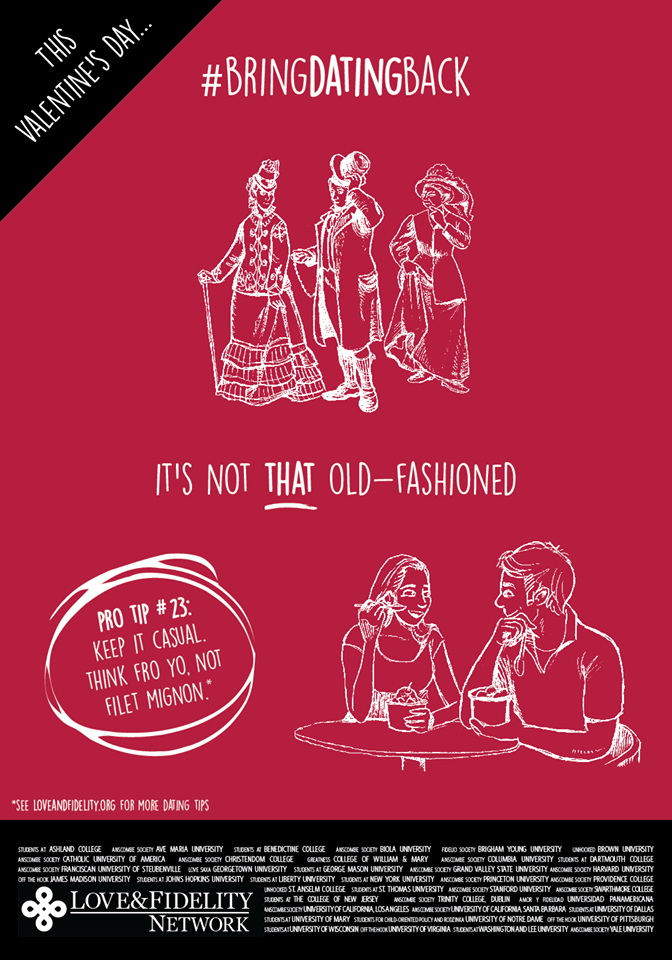These College Students Propose to Bring Back Dating for Valentine’s Day
Kristiana Mork /
Students at 36 schools across the country are campaigning to bring back dating just in time for Valentine’s Day.
Students from Princeton University to Stanford University, and many schools in between, partnered with the Love and Fidelity Network this week to host flower and candy giveaways, film screenings, discussions, and lectures—all designed to encourage college students to try dating rather than hooking up.
“There’s the hookup script or just the hangout script, but there’s not a path to a romantic relationship,” Christian Say, former president of the Princeton University Anscombe Society, a student organization committed to promoting family, marriage, and sexual integrity, told The Daily Signal.
The Love and Fidelity Network, which provides students with resources to defend marriage, family, and sexual integrity on their campuses, organized the Bring Dating Back campaign last year out of concern that students don’t know how to form healthy relationships. This year the group has eyes on Sunday, which is Valentine’s Day.
It’s a problem of narrative, Caitlin La Ruffa, executive director of the Love and Fidelity Network, told The Daily Signal.
“There are only two narratives,” La Ruffa said. “One narrative is the hookup culture, which is anonymous; there’s no communication and no caring. Students get hurt, and it’s just not healthy.”
The other option is being “overly attached” and “codependent” before even getting to know each other, she explained.
“We’re here to propose a new script, a script that says an invitation to coffee isn’t a marriage proposal, just a way to get to know someone.”
During its first year, the campaign focused on providing practical dating advice, like how to ask someone on a date, where to go, and how to be courteous without being creepy.
“This year we decided to tackle fewer how-tos and more encouragement to get over dating hang-ups” La Ruffa said.
This year’s encouragement came in the form of bright red posters featuring the campaign hashtag, #bringdatingback, and cartoons demonstrating how dating “isn’t that complicated” or “that old-fashioned.”
“I loved the idea of promoting healthy dating on campus through posters,” Laura Wittmann, a senior at Ave Maria University, told The Daily Signal in an email. “The posters spark conversations that might not be happening anyways, and I hope that they inspire students to ask each other out.”
The current president of Princeton University’s Anscombe Society, Thomas Clark, notes that the campaign encourages young men and women while they combat the hookup culture.
“Often we hear news about bad relationships on campus,” Clark told The Daily Signal, referencing recent Princeton University sexual assault reports. “There’s lots of bad news, but there’s plenty of action to be taken as well. There is still good news.”
James Lopez, a full-time worker and graduate student at Biola University, notes that the Bring Dating Back campaign’s flower giveaway has brought happiness to his campus.
“We see a lot of happy faces and a lot of smiles,” he told The Daily Signal. “A lot of people find the courage to give a girl a flower.”
“On Sunday we pass out candy with a note saying, ‘Don’t be just a night, you’re worth a lifetime,’” Nate Eggleston, a junior at the University of Pittsburgh, told The Daily Signal.
“Last year we used up two big boxes of candy in half an hour,” he added. “We made a lot of people’s day.”
Eggleston says the campaign addresses a very real fear of dating among students.
“I tell people it’s hard, you are going to mess up, but it won’t be as embarrassing as you imagine it to be,” he said.
Eggleston survived the perils of dating and is now engaged to an engineering major at Carnegie Mellon University.

The Love and Fidelity Network first introduced the Bring Dating Back campaign last year. (Photo: Love and Fidelity Network)
Eleanor Debreu, a senior and music major at Columbia University, told The Daily Signal that time commitment is also a dating deterrent.
“Columbia students are always busy. We think in terms of time. You want to do things that are worth your time. Do you have time for a casual date?” she said.
“My answer is, go for it. You can get to know someone and not have to get romantically involved,” she said. “It makes us human, having these conversations and getting to know each other.”
Though the campaign is too new to boast statistical results, students hope that it helps others think seriously about how they approach relationships.
“I haven’t seen the effects yet,” Debreu said. “But I think it’s helping in a subtle way. It makes people think about how they approach things and how they think about dating.”

